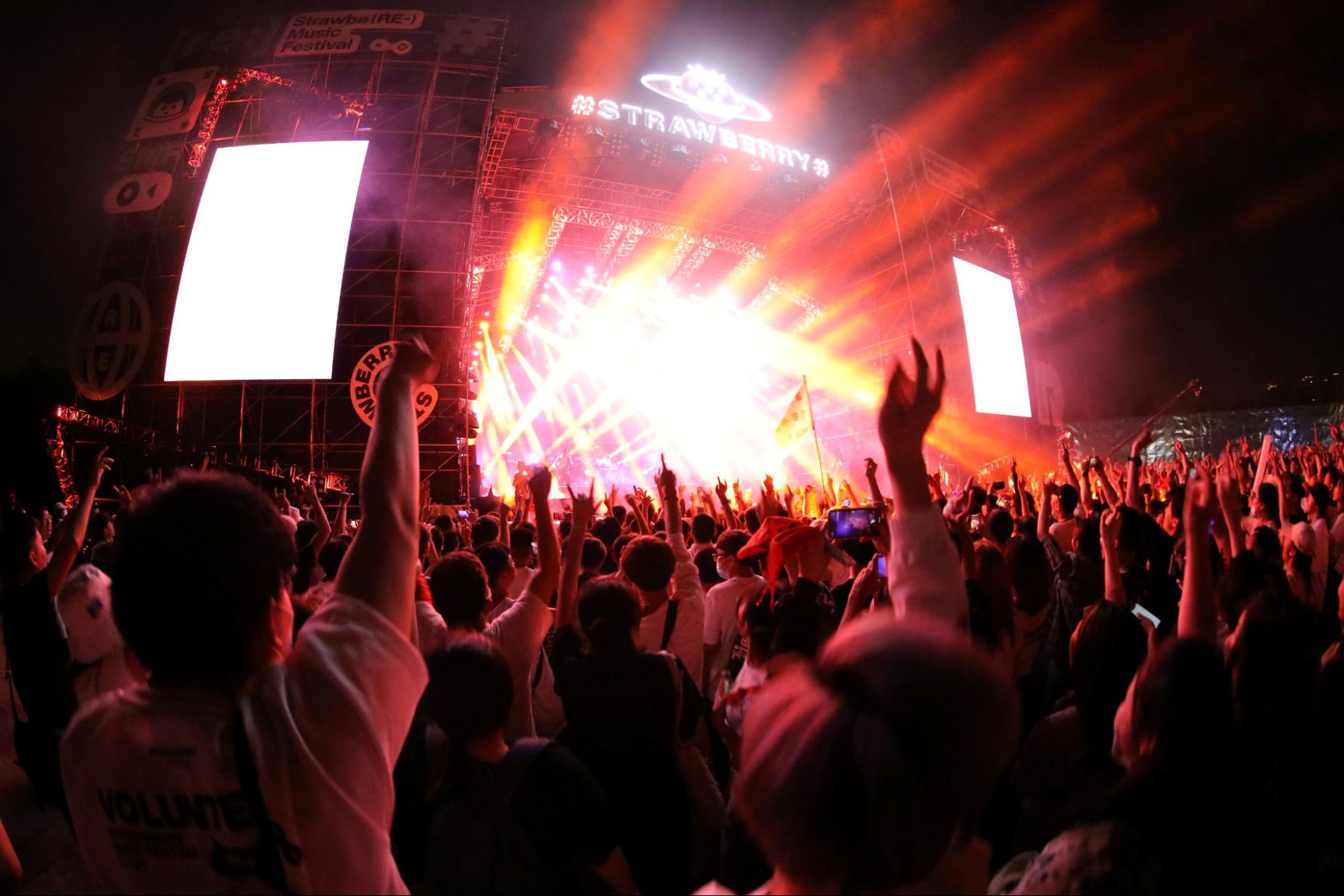Shijiazhuang rebrands itself as the Chinese capital of rock ‘n’ roll
Tapping into the city’s rock 'n' roll roots, the local government of Shijiazhuang is hoping to transform its image from a smoggy industrial hub into a popular destination for music lovers. But how much are authorities willing to let people embrace the rock 'n' roll spirit?

You are a music enthusiast and want to go somewhere in China for a week’s vacation. With seeing as many live performances as possible being your priority, you pack your bags and head for…Shijiazhuang?
If this sounds like an unlikely choice of destination, you are not alone. For decades, Shijiazhuang, the capital of Hebei Province in northeastern China, has struggled to attract tourists because of its unenviable image synonymous with air pollution and heavy industry.
China news, weekly.
Sign up for The China Project’s weekly newsletter, our free roundup of the most important China stories.
But Shijiazhuang has been in search of a new identity. And it might have found one — in rock ‘n’ roll.
Faced with a sluggish post-COVID economic recovery and a need for consumer-led growth, the local government of Shijiazhuang announced an ambitious initiative earlier this month to rebrand the city as the Chinese capital of rock.
The main plank in its campaign is a three-month, citywide music festival called “Rock Home Town,” a word-for-word translation of the Chinese characters of the city’s name, “shi,” “jia,” and “zhuang.” Scheduled to begin in July and last through October, the initiative features a series of rock music concerts performed by high-profile artists across the country, according to Shijiazhuang’s tourism authorities.
On any given weekend in the next three months, there will be nearly 20 rock music performances of various scales happening in the city. Meanwhile, local musicians are encouraged to play impromptu gigs in public places, including parks, shopping centers, and even subway cars.
Shijiazhuang and rock music
The unusual rebranding has put Shijiazhuang in the spotlight — and lifted it out of oblivion for most Chinese people. Until recently, the city was “the least famous provincial city in China,” according to a promotional video released by the local government. Home to 11 million people, Shijiazhuang is most famous for its once-thriving textile and manufacturing industries, which fueled China’s transformation from an impoverished agrarian economy into an industrial powerhouse in the 1990s. But as its economy started to modernize and shift away from heavy industry toward services, Shijiazhuang has been in desperate need of an image makeover.
For now, “it’s not as magnificent as Beijing. It’s not as elegant as Shanghai. It’s not as chill as Chengdu. It’s not as residential as Guangzhou,” a local TV presenter says in the promotional clip.
However, little known to many is its storied relationship with rock music, said Nathanel Amar, a Taipei-based researcher and director of the French Centre for Research on Contemporary China (CEFC). “Although Beijing is the birthplace of rock ‘n’ roll in China, Shijiazhuang developed its own rock music scene more or less around the same time,” he told The China Project.
At the center of Shijiazhuang’s rock ‘n’ roll culture is Popular Music (通俗歌曲 tōngsú gēqǔ) and So Rock! (我爱摇滚乐 wǒ ài yáogǔnyuè), two of the earliest and most influential Chinese magazines focusing on introducing rock music — both domestic and foreign — to the Chinese public. A large group of famed Chinese rock musicians also call Shijiazhuang home, including Tián Rán 田然, the guitarist from Miserable Faith (痛仰乐队 tòng yǎng yuèduì), a long-running and well-known rock band formed in 1999, and Zhāng Zhéxuān 张哲轩, the front man of Penicillin (盘尼西林 pánníxīlín), a young indie rock act that has held concerts at Workers’ Stadium in Beijing, one of the largest venues in the country.
According to Amar, author of the Scream for Life blog, where he writes about the Chinese alternative music scene, the most prominent rock band coming out of Shijiazhuang is Omnipotent Youth Society (万能青年旅店 wànnéng qīngnián lǚdiàn), which literally put its home city’s name in the title of its biggest hit, “Kill That Guy from Shijiazhuang” (杀死那个石家庄人 shāsǐ nàgè shíjiāzhuāng rén).
“Everyone in China knows this song. In fact, in other parts of the world, Mandarin-speaking people who keep up with rock music coming out of China likely know this song. It’s that famous,” Amar said.
The song’s popularity at home, however, is an interesting case of how depressing lyrics about Chinese society struck a chord with listeners — before authorities felt the need to alter the message. “The song is about living in Shijiazhuang during the reform era. It’s about people there going through urban transformation, factory workers suffering mass layoffs, and the young generation dealing with the excruciating boredom day in and day out,” he said. Just like how Cuī Jiàn 崔健, China’s first bona fide rock star, captured the voice of his generation with “Nothing to My Name,” “Kill That Guy from Shijiazhuang” is a youth anthem for the current time, Amar added.
This, naturally, didn’t sit well with the government. In 2021, the Hebei Communist Youth League used the song to promote Shijiazhuang, but changed its title to “The Unkillable One From Shijiazhuang” (杀不死的石家庄人 shā bù sǐ de shíjiāzhuāng rén) while editing the lyrics to praise the city for its resilience and working-class spirit. In June, during a concert in Shanghai, Omnipotent Youth Society played an instrumental version of the song without singing its lyrics, with rumors speculating that the unusual performance was an order from the local government.
Barbecue and music
Shijiazhuang’s newfound appreciation for its rock ‘n’ roll legacy comes after the little-known Chinese city of Zibo became a viral tourist destination earlier this year thanks to a barbecue frenzy. Although its popularity exploded organically at first, with videos of its cheap, grilled skewers going viral on social media, local officials of the debt-ridden factory town, located in Shandong Province, were quick to ride the wave of interest, organizing a massive barbecue festival that attracted tourists from all over the country.
Because of the craze, the once-anonymous industrial city achieved 4.7% growth in GDP for the first quarter, which, as per CNN, was mainly boosted by “retail, tourism, and dining.” The same period also saw an 11% increase in consumption, reversing a 2% decline reported in the first two months of the year.
Shijiazhuang’s rebranding is its attempt to reproduce Zibo’s success, according to Steve Tsang, the director of the China Institute at London University’s School of Oriental and African Studies (SOAS). The chief intent behind the campaign is to boost its local economy, Tsang told The China Project, adding that the move “reflects the general problems faced by regional governments in China, which is that they are short of financial resources and are practically desperate to give the local economy a boost and increase local government revenue.”
“Whether it is turning to a BBQ or music festival or anything else about which they are not historically known or enjoy a comparative advantage, it reflects an act of desperation as much as entrepreneurship,” he noted.
Tsang predicted that other Chinese cities may want to follow Zibo or Shijiazhuang’s examples in the coming months, and the emerging trend “speaks poorly about the state of the economy in China as a whole.”
Despite a solid start to the year following the removal of most anti-COVID restrictions in December 2022, China’s economy grew less than 1% in the second quarter compared with the previous three months as foreign investment slumped, a real estate slump deepened, and a string of debt-ridden local governments had to slash spending after running low on money.
Official figures show that the unemployment rate of 16- to 24-year-olds in Chinese urban areas hit a record 21.3% last month, although some economists believe the real number may be nearer to half. Having already cut interest rates, China’s leadership has also been grappling with how to spur spending, which has proved to be a tough task as consumer sentiment sours in the face of economic headwinds.
“The central government played a significant role in the economic slowdown, particularly the fall in property prices, which substantially reduces the feel-good factor, and it cannot just expect local governments to come up with miraculous solutions that will put the economy right,” Tsang said.
Rocking out! (But with limitations.)
Although young Chinese have grown increasingly cautious about big purchases, the pandemic-fatigued, outdoor-obsessed generation is still looking for affordable ways to have fun this summer.
For music lovers, the return of live performances and big festivals in the past few months has been an exhilarating welcome. According to local media reports, demand for live entertainment this summer is at an all-time high. Tickets for prestigious music events — such as Strawberry in Beijing and Midi in Yantai — reportedly sold out within hours, with scalpers scooping up admissions and selling them for an exorbitant amount.
In a bid to amp up the local economy, a host of smaller cities have jumped on the music festival bandwagon. During the five-day Labor Day holiday in May, there were more than 40 music festivals in 19 provinces. In comparison, there were approximately 10 shows of similar sizes in the same period in 2019.
As the appetite for live music heats up in the warm months, Tsang from SOAS sees no “compelling reason why Shijiazhuang cannot hold a highly successful rock festival and attract a large number of visitors,” especially “given its location as a transportation hub and relatively short distance from Beijing.” But for the festival to become a cultural event appealing to rock fans all over the country, Shijiazhuang will “need to have a really good and attractive package to offer,” he added.
“One or even an annual successful music festival does not necessarily make the location a tourist magnet,” Tsang said. “What else does Shijiazhuang got to offer to tourists? Is its hospitality and attraction infrastructure sufficient to sustain tourist interest? From what I know, Shijiazhuang is not particularly strong in either, and building them will take time, not like just launching a music festival.”
There’s also the question of how far Shijiazhuang will go in its embrace of rock ‘n’ roll, as common themes in this genre of music include rebellion, freedom, and anti-establishment sentiments, which are seen as “harmful” messages by the Chinese government that might undermine its control.
“What if someone sings rock songs with provocative lyrics on the subway? If police officers intervene, they might argue that the local government gives them the right to do so under the initiative,” Amar said. “I can see it backfiring at some point.”
Amar wasn’t far off in his prediction. Less than two weeks into the initiative, local officials in Shijiazhuang already had to rein in the enthusiasm and draw the line at inappropriate behavior on the stage. On Tuesday, the Shijiazhuang Municipal Bureau of Culture, Radio, TV, and Tourism announced a 200,000 yuan ($28,000) fine for a live music venue after receiving a complaint that a rock musician pulled off his pants and played songs in his underwear when performing.
“The government will continue to strengthen its supervision of performances,” the local government said, stressing that the show wasn’t part of its official lineup for the festival. “We hope that performers and staff will consciously abide by laws and regulations, strengthen morality, and provide healthy and positive entertainment for audiences.”






